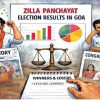Goa is abuzz with excitement as vintage bike and car owners, users, collectors and fans are decking […]

A Prescription for Health & Happiness for Doctors!
July 01- July 07 2023, MIND & BODY, HEART & SOUL June 30, 2023The Goan Observer wishes all our superheroes in whitecoats a very “Happy Doctor’s Day on July 1!” July 1 is observed as National Day for Doctors and we thought, for a change, we should focus on the health of our healthcare providers. We spoke to Dr. Amit Dias, MD, from the Department of Preventive & Social Medicine, Goa Medical College & Hospital, to get interesting insights into issues faced by the doctors….
QUESTION: Doctor, at the very outset, wish you and the entire medical fraternity a very Happy Doctor’s Day! I was always curious to know, doctors take care of the health of others, but how well do they take care of themselves?
ANSWER: Thank you for your wishes. Yes, doctors do indeed take care of others, that’s our job and that’s what we love to do. However, doctors are very bad patients. We often tend to ignore ourselves and our health. A recent study conducted by the IMA reveals that the life expectancy of a doctor is around 55-59 years whereas that of an average individual is 69-72 years!
Q: Those are startling figures! What could be the possible causes for this?
A: Several factors increase the risks for doctors. The Covid-19 pandemic highlighted some of them — as doctors, we are in the line of fire dealing with all kinds of infectious diseases and though we do take precautions, doctors, remain at high risk of catching the infection. We are also exposed to more severe forms of diseases and resistant bugs which are difficult to treat. Doctors could be exposed to dangerous levels of harmful radiation. While doing surgeries, doctors can get cuts and are exposed to dangerous diseases like HIV. Sometimes the surgeries are long and tedious but doctors go through the ordeal to save the patient – sometimes at the cost of their own health. Inadequate sleep, difficult working hours, skipping meals, unhealthy food and workplace stress increase their risk of burnout, disease and sometimes sudden death.
Q: Could you elaborate on stress in doctors? Is it different from the average person?
A: There are numerous reasons for stress in doctors. I am glad you asked that question. All doctors should introspect and understand the cause of their stress and find the right ways to manage it. Stress starts right from a medical student’s years. I conducted a study on medical students and found that 16.5% had some amount of depression, Interns and women in particular were more likely to have higher stress scores. Students most commonly complained of being constantly under strain (37 %), inability to concentrate (30%) and lack of sleep (28%).
On average 15 to 20 mg of cortisol is secreted under normal stress and 150 mg under maximum stress. A study conducted on doctors revealed that surgeons and anesthetists have more than 150 mg of cortisol in their blood stream frequently in a day. Doctors are more likely to develop mental health problems, substance abuse, relationship issues, and some may even commit suicide. I read a study that stated that 45% of the doctors got 7 complete hours of sleep per day, 82% reported feeling stressed, 34.5% had high blood pressure, 18.5 % had diabetes, 61.6% were fearing violence while attending to their patients, 75% had anxiety related issues. Interestingly, only 8% of the doctors wished that their children would also become doctors, which kind of sums up what they are going through.
Burnout not only affects the doctors, but their burnout will affect the patients as well. Studies have shown that doctors with burnout had 45% to 63% higher odds of making a major medical error in the following three months as compared to those who didn’t have it. It is a vicious cycle as stressed-out physicians are more likely to further neglect their health. It is something we cannot neglect.
Q: That’s quite alarming and one needs to take care, right?
A: The problem is not just the stress, but the inability to recognize the signs of burnout and develop methods to deal with the stress. We often give a listening ear to our patients who go through a log of emotional issues, we do try to dissociate ourselves from it, but it sometimes does get too overwhelming. Doctors who face a lot of traumatized patients often experience compassion fatigue. Prolonged exposure to traumatic recollections and disturbed lives of other individuals worsens this.
Doctors sometimes sacrifice their friends and hobbies to make time for their profession which is detrimental to their health. We may have a tough day at home, and our children may be sick, yet we have to have a smile on our faces and attend to our patients. Doctors could be working for nearly 72 hours at a stretch with hardly any sleep. Often doctors work the whole night and have to report back on duty in the morning.
To worsen the matter, the workplace environment may not be very sensitive. It’s often an issue similar to the typical relationship between the mother-in-law and the daughter-in-law. If the junior complains about a problem or work stress, the immediate reply is that “We did much more than this when we were in your stage, stop complaining and go back to work.” Instead, just some empathy and listening to the problem would have made all the difference. Junior doctors would have felt recognized, felt a sense of achievement, and bounce back enthusiastically to work. Recently, my wife had COVID and I was denied leave to attend to my family. Doctors themselves need to understand that their colleagues are humans and empathy starts at home. Doctors today also work in an increasingly litigious environment, it is unforgiving in cases of errors of judgment or mistakes. They are given roles as administrators with absolutely no training for the job.
If we do not invest in the care of health caregivers, we will not be able to improve the quality of care that they give. Nurses, for example, work through shift duties which is not the case for doctors. There is a need for team-building exercises, doctors have to be given breaks to rejuvenate which will help improve their productivity.
The statistic that doctors die more than a decade earlier than the general population is a serious one and is a wake-up call for not only individual doctors but for the health care system as a whole.
Q: What is your opinion on the increasing instances of violence against doctors?
A: Violence against doctors — physical as well as mental, should be condemned. There have to be stricter laws to protect healthcare professionals. Doctors are often soft targets. People feel that they can vent their grief and frustration by hitting the doctor and damaging the hospital. Recently a young lady doctor, Dr Vandana Das, while doing her rural posting, was stabbed by her patient in the OPD for no fault of hers. 75% of doctors in India have faced violence.
I remember an incident as a resident doctor at our health center. I was counseling a patient in the OPD for his alcohol problem and guiding him not to drink as it was affecting his health. That night the patient came to the hospital with another man, abusing everyone, completely under the influence of alcohol, to hit the doctor who told him not to drink. I was on duty that night and fortunately, when he saw me, he didn’t recognize me in his intoxicated state. I spoke to him calmly and told him that I will phone and call the doctor he met in the OPD and I phoned the police in Agacaim right in front of him…those were the days we didn’t have mobile phones. The police immediately came and handled the situation tactfully, it could have got violent but it didn’t because of timely intervention. There was a time when doctors were respected as gods! However over the years, the attitude toward doctors has changed and a lot has to do with the way the media project doctors.
Q: Why do we observe Doctors Day on July 1?
A: It is observed in memory of Dr BC Roy, MRCP, FRCS, for his contribution to healthcare system in India. It is his birth and death anniversary on the July 1. It is an opportunity to voice out issues affecting the medical fraternity and our concerns on such days. We also need to strengthen medical education and produce highly skilled world class competent physicians, capable of dealing with the changing healthcare scenario in the world.
Q: What’s your advice for our readers and doctors?
A: I would like to give a prescription of health and happiness to all my colleagues who strive relentlessly to bring smiles to the faces of their patients. Medicine is a challenging and tough field. As the saying goes, when the going gets tough, the tough get going. But we make it tougher by ignoring our own wellbeing. Be kind to yourself and make time for yourself and your family. Doctors need to follow the advice they give to their patients. Have a life beyond your profession and follow your passion. The medical profession is a vocation and despite the burnout, it brings with it joy and a sense of accomplishment that cannot be put into words.
Happy Doctor’s Day! A happy doctor will have happy patients!
About the expert: Dr. Amit Dias, MBBS, MD is a faculty in the Department of Preventive and Social Medicine at the Goa Medical College and has been working in the area of mental health and research for more than two decades.















